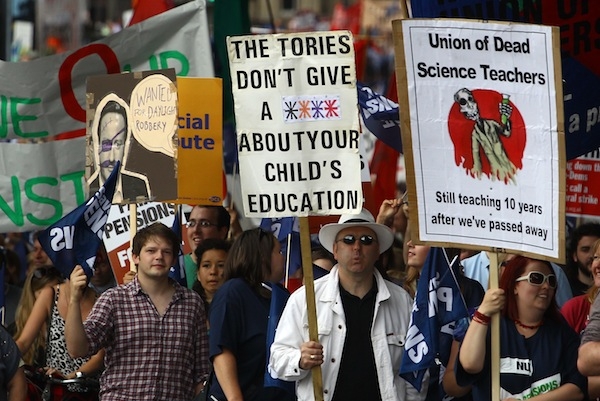The teaching unions like to dismiss talk of introducing regional pay to the public sector as a plan that will hit deprived areas hardest. Their fierce opposition to the plans touted by Michael Gove and other ministers threatens to crystallise into strike action should the government make any serious moves towards the changes.
But research from Bristol University published today changes the terms of the debate rather, as it suggests that pupils are paying the price for a national pay rate for teachers. The study, which compared pay to performance in around 3,000 schools, found that in areas where salaries in the private sector are significantly higher than in schools, pupils can drop one GCSE grade in one subject.
It says centralising pay creates a ‘ceiling’ for teachers working in affluent areas where private sector wages are higher, and could lead to schools in those areas struggling to recruit and retain good staff. The report concludes:
 The graph above might be something the union wants to have a chat about with its maths teacher members before it promotes it too widely as part of its ‘Standing up for Standards’ campaign…
The graph above might be something the union wants to have a chat about with its maths teacher members before it promotes it too widely as part of its ‘Standing up for Standards’ campaign…
‘The number of pupils who would benefit from any gain in teacher performance, the fact that the associated gain in education will have returns over a long time period and the non-convexity in the response to wage regulation, means that the long term gains from the removal of regulation could be very large.’
Schools minister Sarah Teather said this afternoon that ministers had asked the School Teachers’ Review Body ‘just to look at the evidence and look at what flexibility might be required’. This is awkward for the unions because they now appear to be opposing something that looks like it could benefit pupils, although the NASUWT argued today that the report was actually based on flawed methodology. The unions also oppose performance-related pay – which is separate to the regional pay plans but could help schools retain the most talented staff – even though a Sutton Trust survey found in May that three quarters of teachers themselves backed linking annual salary increases to performance. Labour’s shadow education secretary Stephen Twigg may also find this uncomfortable. Back in May he said this:‘National pay and conditions, combined with some flexibility for schools is the fairest and most efficient approach.’
The NUT’s ballot on whether to take industrial action over a very wide range of grievances with Michael Gove closes on 6 September. Among those issues is regional and local pay. If the ballot does return in support of strike action, it will be interesting to see whether the union leaders continue to cite regional pay following this study. Still more interesting will be whether Twigg feels it is politically expedient to support them, or whether he wishes to focus more on what ‘some flexibility for schools’ might mean. P.S. After reading the NASUWT’s statement about ‘flawed methodology’ on their website, I fell upon this rather amusing error in a report about teachers’ morale: The graph above might be something the union wants to have a chat about with its maths teacher members before it promotes it too widely as part of its ‘Standing up for Standards’ campaign…
The graph above might be something the union wants to have a chat about with its maths teacher members before it promotes it too widely as part of its ‘Standing up for Standards’ campaign…







Comments